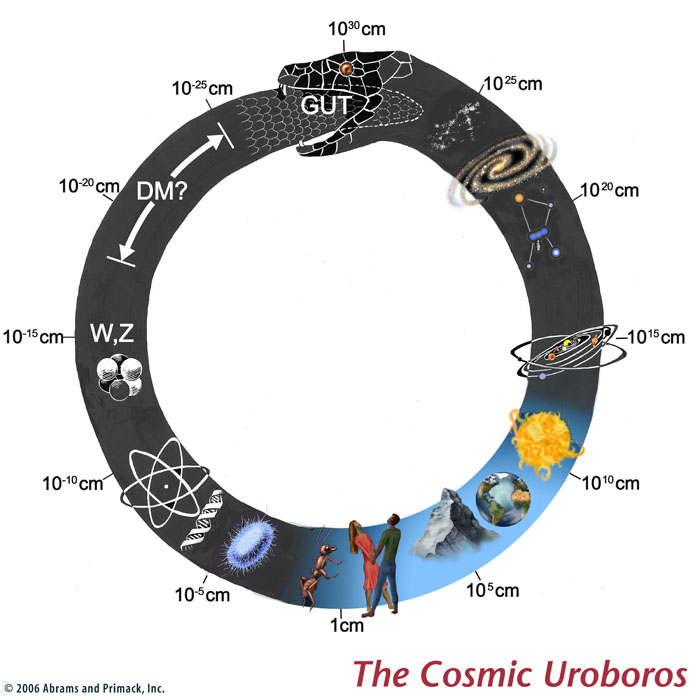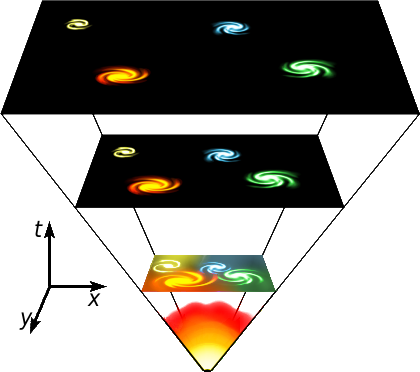Introduction to Modern Cosmology
Modern Cosmology, as a branch of Astronomy, is the study of the largest-scale structures and dynamics of the Universe and is concerned with fundamental questions about its formation and evolution. For most of human history, it was a branch of metaphysics and religion. Cosmology as a science originated with the principle which implies that celestial bodies obey identical physical laws to those on Earth, and Newtonian mechanics, which first allowed us to understand those laws.
Cosmology began with the twentieth century development of Albert Einstein's general theory of relativity and better astronomical observations of extremely distant objects. These advances made it possible to speculate about the origin of the Universe, and allowed scientists to establish the Big Bang Theory as the leading cosmological model. Some researchers still advocate a handful of alternative cosmologies; however, cosmologists generally agree that the Big Bang theory best explains observations.

Cosmology draws heavily on the work of many disparate areas of research in physics. Areas relevant to cosmology include particle physics, experiments and theory, astrophysics, general relativity, and plasma physics. Since the Universe itself started as an infinitesimally small anomaly (singularity) the laws of infinitely small govern its evolution the same way a seed determines the fully grown tree structure. Thus, Cosmology unites the physics of the largest structures in the Universe with the physics of the smallest structures in the Universe. This is graphically shown in the picture of the Cosmic Ouroboros. The Ouroboros is an ancient mythological serpent that swallows its tail. Down through the ages many cultures have associated it symbolically with the creation or the renewal of the world and the unity of all things. Interestingly, given what present day scientists know about physics, astronomy, and cosmology, the ancient Uroboros perfectly symbolizes the universe so the updated and renamed Cosmic Ouroborus by present day scientists is a science based mythology for the Third Millennium!
The Big Bang theory, as we mentioned above, is the prevailing cosmological model of the early development of the Universe. The most commonly held view is that the Universe was once (about 13.8 billion years ago) a gravitational singularity, which expanded extremely rapidly from its hot and dense state (see picture). We present elements of the Big Bang in a separate article. While this expansion is well-modeled by the Big Bang theory, the origins of the singularity remains one of the unsolved problems in physics.
The Big Bang theory, as we mentioned above, is the prevailing cosmological model of the early development of the Universe. The most commonly held view is that the Universe was once (about 13.8 billion years ago) a gravitational singularity, which expanded extremely rapidly from its hot and dense state (see picture). We present elements of the Big Bang in a separate article. While this expansion is well-modeled by the Big Bang theory, the origins of the singularity remains one of the unsolved problems in physics.

Cosmologist offer two competing types of explanations for the origins of the singularity. One cosmogonical view sees time as fundamental and even eternal: The Universe could have contained the singularity because the Universe evolved or changed from a prior state (the prior state was "empty space", or maybe a state that could not be called "space" at all). The other and more widely accepted view, held by proponents like Stephen Hawking, says that there was no change through time because "time" itself emerged along with this Universe (in other words, there can be no "prior" to the Universe). Thus, it remains unclear what combination of "stuff", space, or time emerged with the singularity and this Universe.
One problem in cosmology is that there is currently no theoretical model that explains the earliest moments of the Universe's existence because of a lack of a testable theory of quantum gravity. Researchers in string theory, and its extensions, or quantum cosmology, have nevertheless proposed solutions of the type just discussed. Another issue facing the field of particle physics is a need to experimentally test the proposed theories.
Developing a complete theoretical model has implications in both the Philosophy of Science and Epistemology. For example, it would clarify some of the meaningful ways in which people can ask the question "why do we exist?".
Cosmology is the science that attempts to explain all observations relevant to the development and characteristics of the Universe as a whole but questions regarding 'why' the Universe behaves in such a way have been described by physicists and cosmologists as being extra-scientific (i.e., metaphysical), though speculations are made from a variety of perspectives that include extrapolation of scientific theories to untested regimes, and philosophical or religious ideas.











